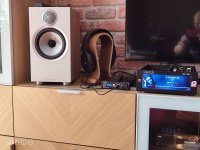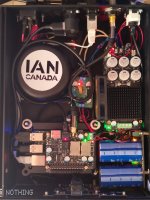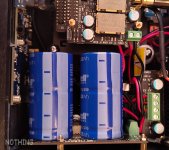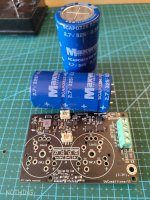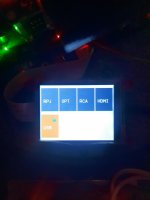The complete system. The transformer in a box with the dual linear pi pro's have replaced an Allo Shanti power supply, and it seems like quite an improvement sonically so far. Using data blocker usb c cables (only 3 pins connected and no electronics) to the streamer and DDC.

The transformer is in an ABS plastic enclosure with a power inlet added on one side and speaker posts for the output on the other. Pretty cheap:which enclosure are you using?
https://www.amazon.com/gp/aw/d/B07D23BF7Y
I bought the taller version of that enclosure (not pictured) for the linearPi pro's, which I will stack inside.
The raspberry pi compute module 5 is mounted on the official I/O board in the official case that goes with it.
How did you connect the ground? My StationPi has shields soldered between the RPI and audio HATs, but without grounding those I guess their effectivness is limited.

What is "Analog Ground" mentioned on the PCB? Is that the main ground?
What is "Analog Ground" mentioned on the PCB? Is that the main ground?
I didn't 🙂How did you connect the ground?
I've been thinking about adding a grounding post to the transformer enclosure and switching to a grounded inlet, but it honestly sounds about as good as I could've ever imagined right now, so maybe some day a long way in the future I'll try.
DC circuits are weird to me. I'm no electronics engineer so I do get confused by the way the term "ground" gets used. Rather than the safety ground sometimes it refers to something else.
Hi, pls help me to choose. I have experience with Raspberry 4 and Iancanada TransportPI Digi (version 1) with Accusilicon clocks and Hifiberry DIGI + Pro. I use COAX connection.
In Hifiberry bass is for me way better - more definition, vibrations, more oomph but I lost separation and depth from Iancanada. I thinks string instruments are more real on Hifiberry.
What is better:
a) Iancanada TransportPI Digi II + SC Pure clocks
b) Allo Digione Signature
c) stay with Hifiberry
d) Any suggestions for a source within a budget slightly above these overlays (can be used conditions).
Is version II of Iancanada sonicly better than first (COAX connection)? Is bass response depend on clocks I use? SC Pure will be better?
Ps. sorry for my english 😛
In Hifiberry bass is for me way better - more definition, vibrations, more oomph but I lost separation and depth from Iancanada. I thinks string instruments are more real on Hifiberry.
What is better:
a) Iancanada TransportPI Digi II + SC Pure clocks
b) Allo Digione Signature
c) stay with Hifiberry
d) Any suggestions for a source within a budget slightly above these overlays (can be used conditions).
Is version II of Iancanada sonicly better than first (COAX connection)? Is bass response depend on clocks I use? SC Pure will be better?
Ps. sorry for my english 😛
Some interesting comparisons of the clocks from Ian here:Is bass response depend on clocks I use? SC Pure will be better?
https://iancanada.ca/blogs/news/imp...ked-ddc-streamer-transport-and-sc-pure-clocks
I don't have much experience with the other boards you mention, but I do think the rpi5 sounds better in general than the rpi4.
I've been really liking the rpi CM5 with I/O board as a USB source into my DDC. It actually has better bass then the regular rpi5.
There is also something nice about the direct i2s output of the rpi5 into a HAT. If I were using spdif I might go that route, as you're generally limited to lower sample rates with spdif anyway. For higher than 192KHz/dsd64, I would go with a DDC approach instead.
Friends, the super capacitors and 3.3V control board from IAN CANADA have arrived.
I have to honestly say that this is a real upgrade for the audio chain!
Powering the sound card and Isolator III.
https://www.audiophonics.fr/en/powe...-capacitor-conditioner-board-33v-p-17924.html
https://www.audiophonics.fr/en/ultracapacitors/maxwell-supercapacitor-27v-325f-p-14602.html
I have to honestly say that this is a real upgrade for the audio chain!
Powering the sound card and Isolator III.
https://www.audiophonics.fr/en/powe...-capacitor-conditioner-board-33v-p-17924.html
https://www.audiophonics.fr/en/ultracapacitors/maxwell-supercapacitor-27v-325f-p-14602.html
Attachments
Is that IAN Canada 'logo' on your xformer cover, your creation, or something Ian has provided? I like it. 🙂Friends, the super capacitors and 3.3V control board from IAN CANADA have arrived.
I have to honestly say that this is a real upgrade for the audio chain!
Powering the sound card and Isolator III.
https://www.audiophonics.fr/en/powe...-capacitor-conditioner-board-33v-p-17924.html
https://www.audiophonics.fr/en/ultracapacitors/maxwell-supercapacitor-27v-325f-p-14602.html
Hello, any recommendation or I should just buy this setup? Point is to have i2s output. I think I don’t need screen and would be good to have also usb amareno output
#91C + #96D solution
https://iancanada.ca/products/5v-3-3v-power-supplies-solution?variant=49072491397420
https://iancanada.ca/products/flags...-re-clock-ddc-streamer?variant=47598243676460
#80A and #80B are the must to upgrade
https://iancanada.ca/products/sc-pure-extremely-low-phase-noise-audio-clock
#91C + #96D solution
https://iancanada.ca/products/5v-3-3v-power-supplies-solution?variant=49072491397420
https://iancanada.ca/products/flags...-re-clock-ddc-streamer?variant=47598243676460
#80A and #80B are the must to upgrade
https://iancanada.ca/products/sc-pure-extremely-low-phase-noise-audio-clock
Need help, I've tried many different things like changing reaspberry pi's , 2w and 4, but am unable to get the output information (clock speed) on the screen. Is there any hints to get it to work? Plus everytime I add the isolatorpi 3 into the stationpi pro, it is making the internet radio stutter in slave mode and no ouput at all in master mode.
Attachments
Hi, so what did you figure out was the reason for no clock speed on the lcd screen? I can't get mine to show the fifo information.@iancanada
I'm finally getting some of my DAC projects ready to leave my bench but still have some lingering questions... My primary goal is to get all 3 displays working together properly. Those would be the ESS Controller, MonitorPi and the 4D Systems LCD panel. My core audio stack includes the following Ian RPi HATs;
StationPi Pro > FifoPi Q7 > Dual Mono DAC > Transformer Output to RCA, and ancillary displays as mentioned above.
I will admit upfront that some of the issues may be unwittingly user introduced. My apologizes if this information may have been covered elsewhere in the forum/thread.
With all of my testing and retesting, the only way to get music - with displays attached - is with configuration #2 as noted below;
The selection LCD is optional, and when attached as shown, it does display the FiFo data in the lower right-hand of the screen.
#1 config (no music)
o Original ESS controller attached to the non-isolated GPIO header on the Q7.
o MonitorPi attached to DAC isolated GPIO header.
o 2.4" LCD display attached to the StationPi Pro connector.
#2 config (music!)
If I swap the ESS controller display with the MPi all seems to be well;
o Original ESS controller attached to the isolated DAC GPIO header.
o MonitorPi attached to Q7 non-isolated GPIO header.
o 2.4" LCD display attached to the StationPi Pro connector.
The only conclusion I can draw is that the ESS controller must be attached to the DAC isolated GPIO header for all 3 displays to work correctly and output music. In configuration #2 both seem to be controlling the DAC though. Not sure that's a problem. Is this the way it was intended?
It was my understanding, that the MonitorPi is (should be) capable of playing music without the ESS controller attached as well? But that doesn't seem to be the case. The MPi displays information as if it was playing a track, but I get no sound. The optional 4D LCD also displays the bitrate and the crystal frequency being used.
With both displays needing to be attached there is a lot of unnecessary redundancy in the information displayed. Maybe this interaction of the 2 displays will be improved upon with the next generation of hardware/software. In addition, I know of no way to turn off the ESS display to help with burn-out with long term usage.
Has anyone else - using similar setup with Ian's great products - have a better understanding of my findings and if 'that's just the way it works'. Or, is there something I've overlooked that would make my working configuration #2 less redundant. Otherwise, I love the modularity of Ian's products, and well... the music speaks itself!
One other thing... Is the Apple remote suppose to control the MonitorPi? I get nothing when used with it.
Config #1 - Music, but no LCD display.
View attachment 1104710
Config #2 - Music and all displays work.
View attachment 1104711
redjr
Sorry I can't help. I can't remember if I ever got it resolved, or how. That particular streamer was never used in any of my systems. (sadly). I moved on to another strmr build, and I cannibalized many of the parts. I also have moved on from using Ian's little color screen. IMO, it was not a workable solution for my needs. In my latest(and best) build, I ended up using the ReceiverPi DDC with the MonitorPi Pro for source selection, along with a 5" touch screen for control and album art.
See build here: https://www.diyaudio.com/community/...fight-the-jitter.192465/page-635#post-7735278
See build here: https://www.diyaudio.com/community/...fight-the-jitter.192465/page-635#post-7735278
I currently have FifoPi Q3. Is Q7 worth upgrading to? Comparison chart says 16bit vs 32bit engine architecture and 1 stage multibit vs 3 stage one-bit reclocker.
Currently have CCHD 957 clock. Stock femtosecon on Q7 better? Thinking about going all-in with SC-pure clock. Any opinions would be appreciated. De-minimus tariff exemptions might go away any time
Currently have CCHD 957 clock. Stock femtosecon on Q7 better? Thinking about going all-in with SC-pure clock. Any opinions would be appreciated. De-minimus tariff exemptions might go away any time
It was enclosure day.

Using Wireworld USB cable internally in the DDC.

MonitorPi on standoffs.


Clear top and spike feet added.

Updated the LinearPi enclosure while I was at it. Ventilation for the heatsinks and binding posts for connecting to the transformer.



Using Wireworld USB cable internally in the DDC.
MonitorPi on standoffs.
Clear top and spike feet added.
Updated the LinearPi enclosure while I was at it. Ventilation for the heatsinks and binding posts for connecting to the transformer.
- Home
- Source & Line
- PC Based
- IanCanada's Latest RPi GB Goodies Impressions... and your tweaks, mods and hints...
